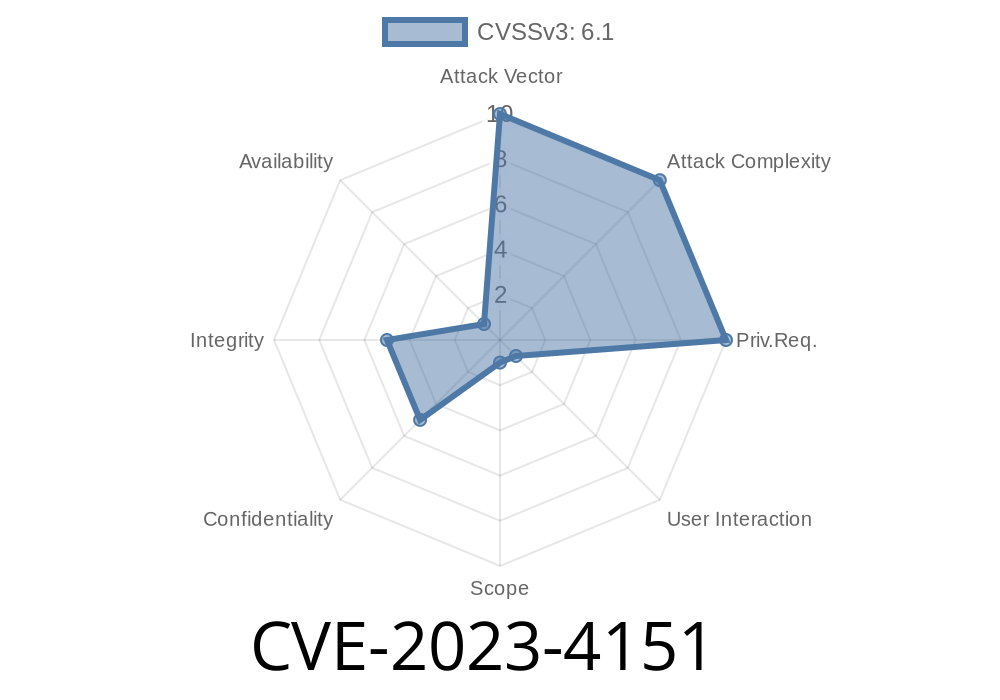WordPress is one of the most popular content management systems out there, powering millions of blogs and websites. Its plugin ecosystem offers amazing functionality, but can occasionally become a breeding ground for security threats. Today, we're diving deep into CVE-2023-4151, a serious vulnerability affecting the "Store Locator" plugin before version 1.4.13. We'll cover how this bug works, show you relevant code, go over possible attack scenarios, and offer tips to secure your WordPress installation.
What is CVE-2023-4151?
CVE-2023-4151 concerns a Reflected Cross-Site Scripting (XSS) flaw in the popular Store Locator WordPress plugin as confirmed by WPScan. Reflected XSS is a type of vulnerability where bad input (from an attacker) is immediately included in a webpage without proper checks, letting an attacker run malicious JavaScript in a targeted user's browser.
Risk: This vulnerability could let an attacker execute JavaScript in the admin's browser, leading to possible site takeover, as admins have the highest privileges.
How Did This Happen?
The Store Locator plugin was not properly checking (“sanitizing and escaping”) a request token called a nonce. This token is meant to prevent unauthorized requests, but the plugin would just print whatever value was sent for it, even if it was malicious JavaScript, in the AJAX response.
Attacker crafts a URL (or JavaScript snippet) with their own script as the nonce.
When an admin visits the URL or clicks a link, the response includes the attacker’s code, which runs in the browser.
Code Snippet: The Vulnerable Part
Here's how such a bug might look in the code
*(for illustrative purposes only!)*
add_action('wp_ajax_store_locator_action', 'store_locator_ajax_callback');
function store_locator_ajax_callback() {
if ( ! isset( $_POST['_wpnonce'] ) ) {
echo "Missing nonce!";
wp_die();
}
// VULNERABLE: No sanitization or escaping
$invalid_nonce = $_POST['_wpnonce'];
if ( ! wp_verify_nonce( $invalid_nonce, 'store_locator_action' ) ) {
// Unsafe echoing back the invalid_nonce
echo "Error: Invalid nonce: " . $invalid_nonce;
wp_die();
}
// safe code continues
}
The echo statement above will output whatever was received for _wpnonce.
If it's <script>alert('XSS')</script>, that's outputted and JavaScript runs as soon as the admin sees the AJAX response (often in the dashboard).
Payload is executed:
Anything from stealing cookies, session hijacking, to creating new admin users or defacing the site can happen.
You can submit this POST data
action=store_locator_action&_wpnonce=<script>alert('XSS')</script>
If an admin triggers this (perhaps by clicking a crafted link or visiting a page with this malicious AJAX request), a pop-up would show, proving XSS.
How to Protect Yourself
1. Update the Plugin:
The vulnerability was fixed in version 1.4.13. Get the newest version here.
2. Sanitize and Escape All Inputs/Outputs:
As a plugin developer, always use esc_html(), esc_attr(), or similar WordPress functions.
3. Limit Admin Exposure:
Never click unknown links as an admin. Use a separate browser profile for admin tasks.
4. Security Plugins:
Consider Wordfence or similar tools for added protection.
More References
- WPScan Security Advisory: CVE-2023-4151
- NVD Details: CVE-2023-4151
- Plugin Patch Changelog
Final Thoughts
CVE-2023-4151 is a textbook example of why sanitizing and escaping user input is so important in WordPress development. If you’re running the Store Locator plugin, or any plugin, always keep it up to date. Even a tiny oversight like this can let attackers take over your site.
Stay safe, keep your plugins current, and always code defensively!
*Exclusive analysis by ChatGPT. For educational use and ethical security research only. Never exploit vulnerabilities without permission!*
Timeline
Published on: 09/04/2023 12:15:10 UTC
Last modified on: 11/07/2023 04:22:11 UTC
